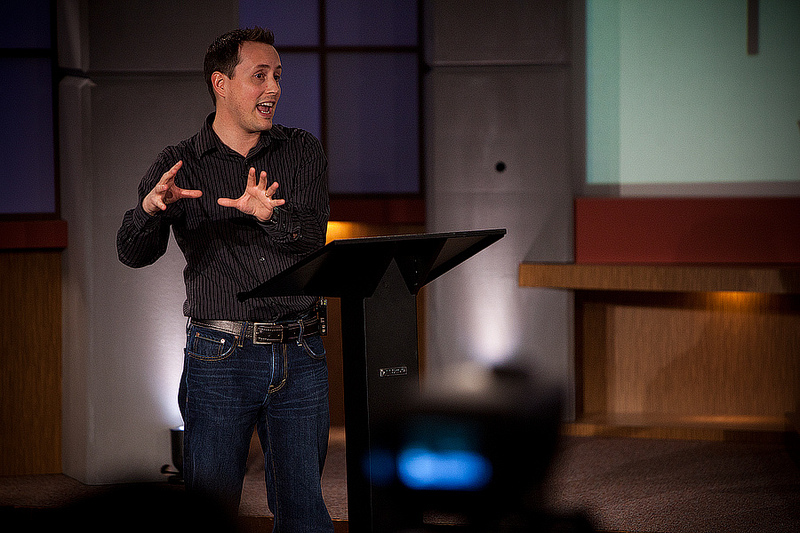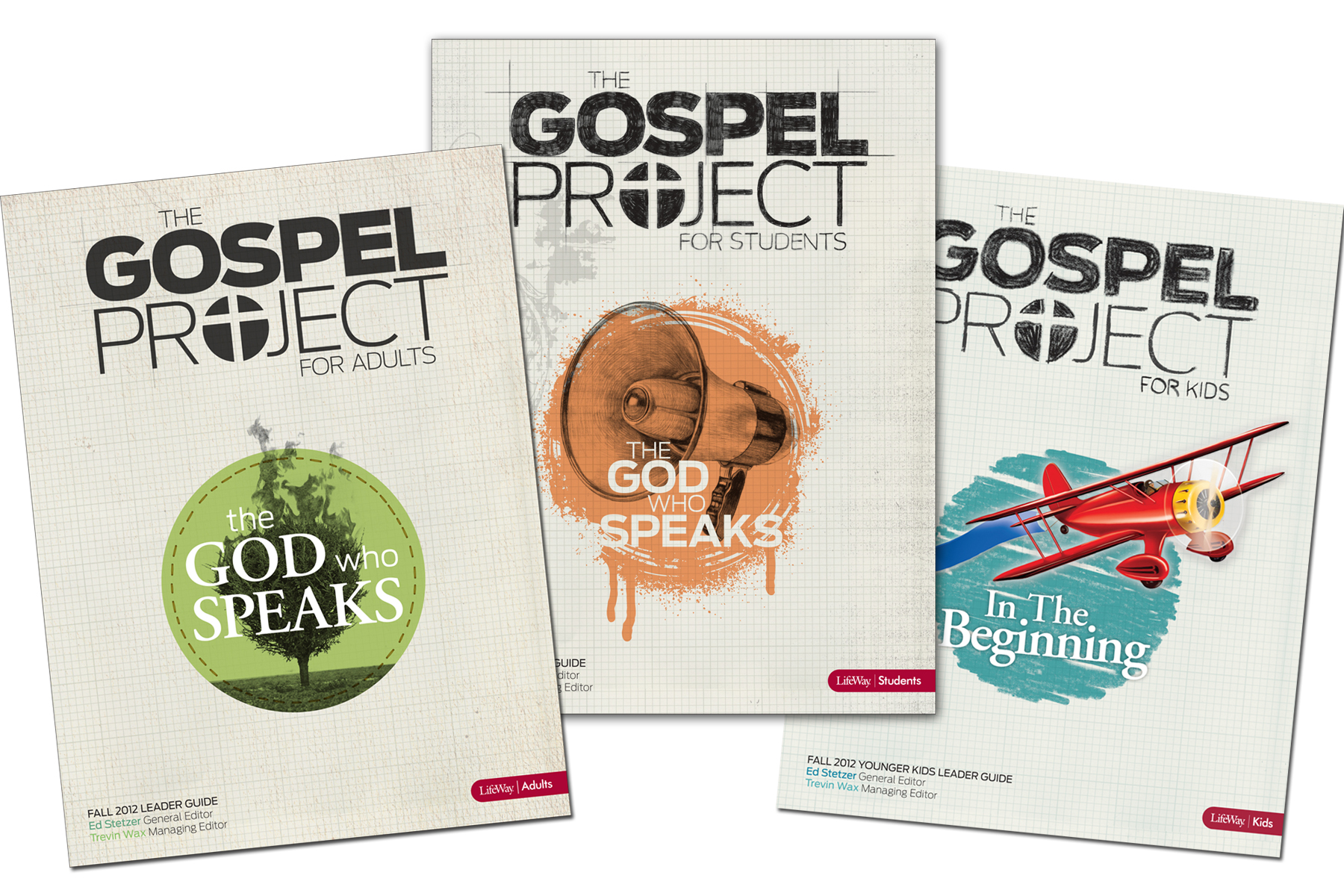 [1]
[1]NASHVILLE, Tenn. (BP) — The latest small group curriculum from LifeWay Christian Resources won’t launch until September, but interest in it is already high — so much so that nearly 6,000 churches have downloaded sample lessons, five months before its launch.
It even “trended” on Twitter one day.
 Called “The Gospel Project,” it is LifeWay’s first age-wide ongoing curriculum in more than a decade, and its goal is to provide in-depth, Gospel-centered lessons within a three-year cycle.
Called “The Gospel Project,” it is LifeWay’s first age-wide ongoing curriculum in more than a decade, and its goal is to provide in-depth, Gospel-centered lessons within a three-year cycle.
Trevin Wax, managing editor of The Gospel Project, said he’s been encouraged by the number of churches wanting to use it.
“It just shows the level of interest that there is in a very Christ-focused approach to the Scriptures,” Wax told Baptist Press.
The day in March that LifeWay held a webcast with Wax and others involved in the curriculum’s development, the phrase “#TheGospelProject” was the second-most popular item on Twitter worldwide that day — beating out other top news of the day, such as discussion of NFL quarterback Peyton Manning’s future.
The Gospel Project curriculum will be available for three age groups: kids, students and adults. It will be written within the parameters of the Baptist Faith and Message, Wax said.
Baptist Press talked to Wax, asking him more details about the curriculum’s development, direction and themes. Following is a transcript:
BAPTIST PRESS: Tell us why you are excited about this project.
 TREVIN WAX: When I was on staff at a church, I was always looking for curriculum that would point people back to Jesus and make sure that the Bible is presented as the story that has Him as the center — and draws application from what He has done for us. I’m excited to see how a theologically structured curriculum is going to connect to the Gospel as the heartbeat of the Bible, and then see that captivate people’s affections and emotions to the point that it results in missions. To see missional application flowing from the Gospel as it’s presented in the biblical storyline — that really excites me.
TREVIN WAX: When I was on staff at a church, I was always looking for curriculum that would point people back to Jesus and make sure that the Bible is presented as the story that has Him as the center — and draws application from what He has done for us. I’m excited to see how a theologically structured curriculum is going to connect to the Gospel as the heartbeat of the Bible, and then see that captivate people’s affections and emotions to the point that it results in missions. To see missional application flowing from the Gospel as it’s presented in the biblical storyline — that really excites me.
BP: Is the curriculum chronological or is it systematic?
WAX: The kids’ version is chronological. It’s three years through the Bible. The adult and student versions are more systematic, but even the systematic is through the lens of the grand storyline of Scripture. So, for example, the first quarter is the “God who speaks.” We’re going over the doctrine of revelation. But it’s structured and presented within 13 weeks within that sort of rhythm of the big storyline — of creation, fall, redemption, restoration.
BP: Has it been tough making that type of curriculum and making it compelling to the listener, placing discussion questions in it? How have you tackled that problem?
WAX: Any curriculum development is tough. My respect level has gone up so much for anyone anywhere working on curriculum, because now I know how hard it is. As far as making it compelling, we’ve chosen writers and people to be involved who really excel at this. For example, our second and third quarters are Bible overview — Old Testament survey, New Testament survey and tracing through the biblical storyline. In the early development stages, we brought in George Guthrie, [author of] “Read the Bible for Life.” This is his thing, he does this very well. We asked him what passages people really need to see as central to the Bible storyline. Part of what has made it a little bit easier is bringing in writers and people like George Guthrie who have advised us and helped us.
BP: How will the curriculum hold the attention of children? Will there be videos or music?
WAX: There are short videos that tell the Bible story for the week as well as music that helps children learn memory verses by heart. The team is also working on terrific reinforcement activities and crafts that continuously drill in the details and overarching truth of each lesson. I’ve got a preschooler and an 8-year-old, and when I showed them some of the videos and music, they were captivated by what they saw.
BP: Are there videos each week?
WAX: For the kids, yes.
BP: Some people have tagged this as being a more in-depth curriculum. Would you agree with that assessment?
WAX: Yes, but I would want to define what “depth” means. Some people see depth as more information. Other people see depth as immediate application. Whereas I want to take both of those definitions of what deep means and tie them to the Gospel. Information? Yes, but it’s because it’s connected to the Bible’s big storyline. Immediate application? Yes, but it’s because it’s application flowing from what God has done for us. It’s what we are called to do as Christians, but it’s grounded in what Christ has done for us.
BP: And that depth is seen in the children’s curriculum, where even the Old Testament stories will point to Christ?
WAX: That’s right. In fact, we’re approaching each of the Old Testament stories, asking, “What does this tell us about God, who God is, what He’s like?” Then, from there, we move into, “How does this story point us forward to Jesus?”
BP: Are any other publishers doing this, publishing something similar to The Gospel Project?
WAX: At this scope, no. I have seen other publishers that are trying to hit some of the same content. I’m glad to see this approach — no matter where it comes from. But I haven’t seen anyone at this level be able to connect in a three-year cycle.
BP: “This” level meaning what?
WAX: Just the amount of resources we have available as Southern Baptists at LifeWay.
–30–
Michael Foust is associate editor of Baptist Press. For information about The Gospel Project, visit www.GospelProject.com, where sample lessons are available.
